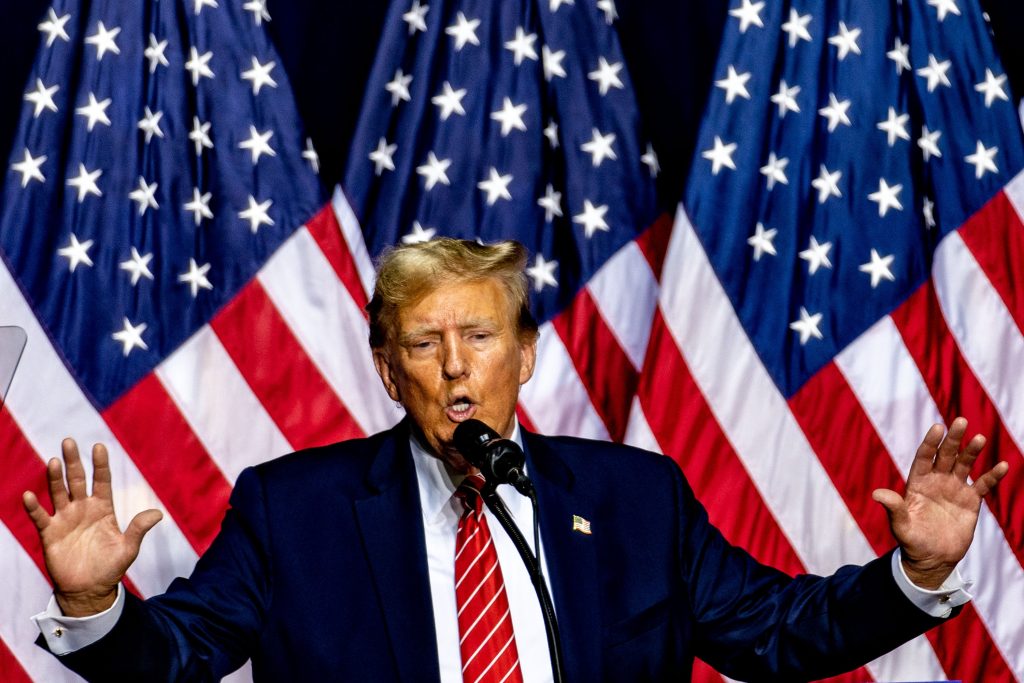Your cart is currently empty!
Donald Trump Reveals the Real Reason He’s Always Steered Clear of Alcohol

For a man whose life has been defined by luxury, power, and excess, Donald Trump’s complete abstinence from alcohol has always stood out. Whether he was known as a real estate mogul, television personality, or political leader, Trump has maintained one unwavering personal rule: he has never touched a drink. It’s a claim he’s repeated across interviews, rallies, and press conferences for decades and one that has shaped his public image just as much as his golden towers or campaign slogans. Yet behind that lifelong choice lies a deeply personal story rooted in family tragedy, discipline, and self-control.
As Trump himself has often explained, his decision to avoid alcohol began with the painful loss of his older brother, Fred Trump Jr. Fred’s struggles with alcoholism and his untimely death left a profound mark on a young Donald, who made a vow that he would never follow the same path. Over time, that vow evolved into something larger: a cornerstone of Trump’s identity. In a world where ambition and indulgence often go hand in hand, his choice to remain alcohol-free became a quiet testament to willpower and self-preservation. Even as he ascended the highest rungs of business and politics, Trump stayed loyal to that early promise and in many ways, it became a symbol of the self-discipline that would come to define his public life.
A Family Tragedy That Shaped His Resolve
Trump has shared the story of his brother Fred countless times, always with a tone of regret and respect. Fred Trump Jr. was the eldest of five siblings in the Trump family and, by many accounts, the most charismatic. Handsome, kind, and easygoing, Fred was beloved by friends and colleagues. But while his siblings followed their father Fred Sr. into the family’s booming real estate business, Fred chose a different path he wanted to become an airline pilot. His independence clashed with the family’s expectations, and tensions grew as his father struggled to accept Fred’s choice.
Unfortunately, Fred’s life began to spiral when he developed a dependence on alcohol. Despite his charm and talent, the addiction affected his health and career, eventually forcing him to return to the family business. He passed away in 1981 at the age of 42, leaving behind a legacy of both promise and pain.

For Donald Trump, then a young businessman in his thirties, the loss was devastating. More importantly, it served as a lifelong warning. As he has recounted in interviews, Fred often told him, “Don’t drink. Don’t smoke. Don’t do drugs.” Trump listened and he never forgot.
The lesson became a guiding principle. Trump has said many times that he believes he might have had what he calls an “addictive personality.” By avoiding alcohol altogether, he felt he had eliminated one potential source of weakness. In a 2018 press conference, he reflected, “I had a brother, Fred. Great guy, best-looking guy, best personality, much better than mine. But he had a problem with alcohol. And he would tell me, ‘Don’t drink. Don’t drink.’ I respected him, and I listened.” Those words, simple as they were, shaped a lifetime of discipline.
Discipline Over Indulgence
From his early business ventures in Manhattan to his years in the White House, Trump has often portrayed himself as a man of iron control someone who can thrive amid chaos because he refuses to succumb to temptation. That self-image, reinforced by his teetotal lifestyle, has become one of his most distinctive personal traits. While others might unwind with a glass of wine, Trump famously prefers Diet Coke reportedly as many as a dozen cans a day. During his first inauguration, while others raised champagne, he toasted with a glass of his favorite soft drink.
His abstinence has often been linked to his philosophy of success. Trump has described self-control as essential to maintaining sharpness and focus, particularly in high-stress environments. As he once joked, “Can you imagine if I had alcohol? What a mess I would be.” The humor in that remark barely conceals the seriousness of his conviction. For Trump, discipline has always been a form of power a way to stay alert, decisive, and, in his view, one step ahead of everyone else.
This mindset also aligns with a broader cultural narrative about leadership. In American politics, sobriety often symbolizes reliability and steadiness. Figures like George W. Bush, who overcame alcoholism, and Jimmy Carter, who abstained for religious reasons, have each used their relationship with alcohol to project moral clarity. Trump’s story fits neatly into that tradition, though it carries its own twist: his abstinence was not born of redemption, but of prevention. He didn’t have to quit he simply never began.
The Health Perspective: A President in Excellent Shape

Trump’s commitment to staying away from alcohol is reflected in his health records, which consistently show excellent physical metrics. According to the White House medical report published by his physician, Navy Capt. Sean Barbabella, Trump’s cholesterol levels, blood pressure, and glucose readings are well within healthy ranges. His triglycerides were measured at 56 mg/dL, HDL (good cholesterol) at 77 mg/dL, and LDL (bad cholesterol) at 51 mg/dL all ideal figures for his age group.
The same report noted that Trump maintains normal kidney and liver function, with test results comfortably within standard limits. His hemoglobin, platelets, and glucose levels indicate good metabolic balance, and his cognitive assessments have been described as excellent. The physician concluded that President Trump “exhibits excellent cognitive and physical health and is fully fit to execute the duties of the Commander-in-Chief and Head of State.”
Such results are impressive for a man in his late seventies, particularly given the high stress of public life. While Trump does take prescribed medication for cholesterol management including rosuvastatin and ezetimibe his overall health profile supports his claim that discipline pays off. Lifelong abstinence from alcohol, combined with regular medical monitoring, seems to have played a key role in keeping him fit for leadership.
Lessons from Loss and Legacy

Beyond personal health, Trump’s story carries a moral dimension a message about learning from loss. In recounting his brother’s death, Trump often highlights not only the dangers of alcohol but also the importance of choices. He has said that witnessing Fred’s decline gave him a deeper understanding of how quickly life can change when addiction takes hold. To him, the tragedy served as a warning about the cost of losing control and the value of staying focused.
That message has extended beyond his family circle. Trump has used his platform to speak about addiction prevention, particularly among young people. In interviews, he has advised that “the best way to avoid addiction is never to start.” It’s a simple statement, but one grounded in personal experience. In this sense, his abstinence represents not only self-protection but also an effort to turn pain into guidance to transform a family tragedy into a broader lesson.
Public health experts might note that Trump’s message aligns with scientific understanding. Research from organizations like the Centers for Disease Control and the World Health Organization shows that avoiding alcohol reduces long-term risks of liver disease, certain cancers, and cardiovascular problems. By promoting a lifestyle of abstinence, Trump inadvertently echoes that advice, positioning his personal story within a larger framework of wellness and prevention.
A Symbol of Control and Character

In the often chaotic arena of politics, personal discipline can serve as both shield and symbol. For Trump, sobriety has become part of his political identity a shorthand for strength, reliability, and self-mastery. Supporters see it as proof of his focus and willpower, a sign that he possesses the internal control necessary to make tough decisions. Even his penchant for Diet Coke, sometimes mocked by critics, reinforces the image of a man who indulges on his own terms but never crosses certain boundaries.
Trump’s abstinence also fits neatly within his philosophy of winning. Throughout his career, he has emphasized the importance of staying sharp and avoiding distractions. In his books and speeches, he often ties success to discipline and mental clarity qualities he believes are undermined by alcohol. The refusal to drink thus becomes more than a personal choice; it is an extension of his competitive nature, an assertion that he will not allow anything to dull his edge.
Critics may question whether such discipline translates into moral virtue, but even they acknowledge that his consistency in this area is rare among public figures. Few leaders maintain a lifelong commitment of this kind, and fewer still tie it so closely to personal experience. For Trump, the story of abstinence functions as a moral compass, a reminder of where he came from and what he stands to lose if he strays.
Beyond Politics: A Human Story

Beneath the headlines and debates, Trump’s relationship with alcohol or rather, his rejection of it is ultimately a human story. It reveals a side of him rarely associated with his larger-than-life persona: the son who lost a brother, the man who learned restraint through grief. In an age where public figures are often defined by scandal or contradiction, his lifelong sobriety offers a counterpoint a personal consistency amid the turbulence of fame and politics.
This dimension of Trump’s character also underscores the complex ways leaders are shaped by their families. His father’s stern expectations, Fred Jr.’s tragedy, and his own ambitions all intertwined to forge a particular kind of discipline. That discipline, whether applied to business, campaigning, or governance, remains one of the constants in his public and private life. It suggests that even in the most powerful individuals, vulnerability can give rise to strength.

The Power of a Promise
Donald Trump’s decision to abstain from alcohol is more than a personal preference it’s a legacy forged in loss and sustained through discipline. What began as a promise to honor his brother’s memory became a lifelong creed that influenced his health, his mindset, and his image as a leader. In a career marked by controversy and complexity, this one aspect of Trump’s life has remained remarkably clear and consistent.
His story serves as a reminder that even the most public figures carry private motivations that shape their actions. For Trump, the lesson from his brother’s life was not merely about avoiding a substance but about mastering himself. In that sense, his abstinence stands as both a tribute and a philosophy: control over indulgence, discipline over desire. And in a political landscape where restraint is often in short supply, that quiet form of self-control might be one of his most enduring strengths.
